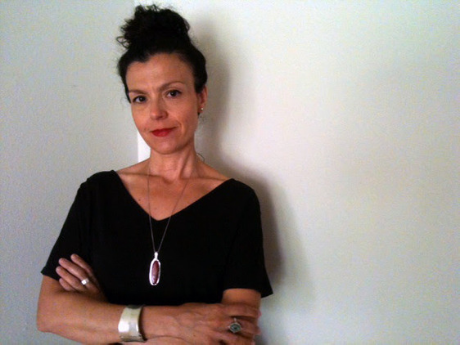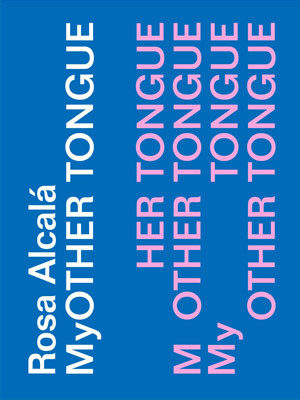In Their Own Words
Rosa Alcalá on “This Is Not the End of My Film Career”

This Is Not the End of My Film Career
Look, I may be no Meryl Streep, but unlike that Daughter of the Revolution, I do my own stunts. Wig or no wig, I'm gonna play the hell out this part. For example, in the first scene, they wanted grandma to break a hip, so I gave them a broken hip: I careened from kitchen counter, over stools, and fell precisely on my mark. People know when they are fooled, they want the real thing. Do you know what I told the director when the "firemen" chopped down the door to save poor old granny? I cannot work like this. They are too pretty to put out fires. I'll just lie here until you find the right type to carry me off screen. The child actors—like my very own children!—grew tired of the delays and shoved the food stylist's props into their mouths. It's the same thing for this extended nursing home scene. I told the director: look, the lighting in here is terrible, and there are so many characters at different hours, I'm not sure we even know what the story is anymore. I'll have to review my contract when my son comes in for his cameo. Did I mention my daughter-in-law wrote the script? She keeps revising it, but the ending's the same. Sure, I've heard the gossip that I'm being replaced by someone younger. One day, I'll just walk out the door and into a location with better exposure.
From MyOTHER TONGUE (Futurepoem, 2017). All rights reserved. Reprinted with the permission of the author.
On "This Is Not the End of My Film Career"
Some years ago, I got a call from my brother to tell me that my mother had fallen and, despite an emergency alert necklace, had spent several hours on the floor before firemen broke down the door. This wasn't the first time she had fallen—and her doorframe was permanently warped from other forced entries—but it was the first time we noticed signs of dementia. There probably had been earlier ones, like the time I visited her apartment, where she lived alone, and discovered in her refrigerator mounds of produce—cabbage and eggplant and green beans—impossible for one person, even ten, to eat in a week. But the memory of childhood hunger during the Franco dictatorship had manifest itself in my mother through either excess of food or its restriction, in her trying to fatten us up or deprive herself. So at the time, I read the event as trauma, not delusion. And then there was the time, while visiting me in El Paso, that she put eggs in the béchamel sauce. What are you doing, I asked, there are no eggs in béchamel. But my mother, who was not to be messed with in the kitchen, insisted: Of course there are. In all of God's existence, she said, there have been eggs in béchamel, and sent me away.
This time, however, after the final fall, the delusions were unambiguous. What my mother believed had happened in her apartment those hours she'd lain alone on the floor was, she said, a scene in a play written by my sister-in-law in which she had been cast as the "grandma." This scene also included children living under her couch (these children would continue to live with her in one form or another in the nursing home, after we moved her out of her apartment). Later, while in the hospital recovering, she told me the woman who shared her room was a film director who wanted to put her in a movie.
Living across the country as all of this unfolded, I pieced together much of this story from distressing phone conversations with my mother and brother, and also from dreams that refracted what I was being told. Though my brother tells me now that he doesn't remember any of it, I was keeping a journal at the time and took notes. But "This is Not the End of My Film Career" isn't a deposition, I guess; it's a poem. And the poem came to me after giving a reading at the University of Maine-Orono, in which I read some new poems that referenced my mother's dementia. In one poem, I describe a visit where my mother told me about a textile factory beneath the nursing home, how the attendants worked second shifts there, how they were laying people off and would soon shut down. Around this time, I had been doing research into the textile factory in Spain where my mother worked from the ages of 14 to 38, and I've often wondered whether talking to her about my findings "inserted" this factory beneath her, or whether it had always been there as a foundational memory that finally had a way to express itself. In any case, these poems about my mother's dementia were weighted with grief and guilt and sadness, but Carla Billitteri, who was there in the audience listening, said to me afterwards, "Your mother is a fabulist!" And I took this to mean that she was also a kind of writer and that these weren't simply delusions, but her stories, her fables, her performance. Later, after reading with Graham Foust in Austin, he asked, "Well, how do you know there's no factory beneath the nursing home?" Both Carla's and Graham's comments helped me to see my mother's situation as not purely tragic, and to question my own sense of how and why reality is constructed.
Conversations with Carmen Giménez Smith and Roberto Tejada also helped me to see this stage in her life not as a "break" from who she was, but as part of a continuum. What I mean by this is that my mother would have been an artist had she been given the chance. The story my mother always told me growing up was that a grade school teacher, recognizing her talent for drawing, asked my grandparents if she could take her to live with her in the city and send her to art school. But they refused. I always sensed in my mother resentment for being denied that opportunity. After the onset of her dementia, I brought this up, and another version of the story emerged: the teacher never intended to send her to school, but to keep her as her maid and nanny. It was a trick, she said, no one can love you that much.
Some may say that her mind was playing tricks on her, but I think it finally returned her to who she always imagined herself to be, a beloved artist. In this tragicomic poem, then, she becomes the actor, rather than the acted upon, while showing, too, the endless negotiations (and disappointments) that take place in enacting every role. By imagining her as this diva with a dwindling film career I also attempted to capture who my mother was: demanding, sometimes petty, and as much a presence as any Meryl Streep. I also tried to show how this imagined scenario revealed her sometimes-fraught relationships to those around her, and her growing sense that she was no longer needed or relevant. In this sense, the poem is also meant to comment on the larger drama of being a woman, whose value is often measured by her youth and beauty, or her maternal piety.
I think it important to acknowledge that the poem, written in a language my mother never fully learned, is my performance, too—in which I play my mother, who in turn plays an actor playing a role that is and isn't my mother. And so, the reference to Meryl Streep is more me than her. She would have likely made reference to Bette Davis, but then I wouldn't have been able to tell my little joke in the first line, which came to me after watching one of those genealogy shows, in which Meryl Streep discovers she's the descendant of a founding member of the Daughters of the American Revolution. You see, my mother was also a daughter of the revolution, except in her case it was the Spanish Revolution. Nevertheless, I believe this line, along with the rest of the poem, reveals the ways in which my mother was a proud woman who believed hard work and how you present yourself was more important than pedigree, who wasn't afraid to call people out for being fake. When my friend Andrea Cote reads her translation of the poem in Spanish, she animates, in the most fabulous way, this larger than life persona. I have a harder time playing that role.



